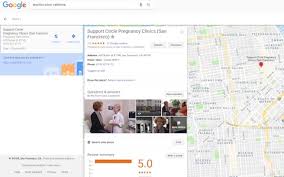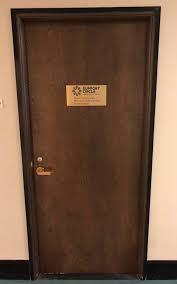British women seeking an abortion are being directed by Google to centres that try and persuade them not to have a termination, a Sunday Telegraph investigation has found.
Search results for abortion clinics across the country suggest addresses and phone numbers to make appointments at “pregnancy crisis centres”, which are often linked to religious organisations, across England, Scotland and Wales.
One link directing women to a Pentecostal church in Llanelli, Wales has been taken down after the church was contacted by this newspaper. Another centre linked to the same church remains on Google Maps.
Other centres also appear in searches for clinics in Aberdeen, Loughborough, Bridgend, Burgess Gate and Horsham.
The trend appears to have come from the United States, where a network of centres, funded by private donors and religious organisations, are increasingly using technology to target women looking for medical help in order to further the pro-life cause.
When a business requests to be listed on Google the owners will be asked which category their service fits into and which search terms they want their website to come up for.
We found pro-life centres had categorised themselves as abortion clinics to appear on Maps. Their websites are expertly peppered with keywords and phrases like “abortion advice” and “abortion help” and the names of legitimate clinics to appear higher in Google’s search engine.
The Sunday Telegraph also found more than 50 pregnancy crisis centres that appeared as abortion clinics on the digital map in the US.
Many websites give the impression they offer terminations, but several are linked to adoption agencies and will try to convince women to carry their children to full term.
Katherine O’Brien, head of media and policy research at the British Pregnancy Advisory Service, said it could become more common in Britain. “Pro-life organisations in the UK see what works in the US and then they adopt those tactics,” she said.
“I wouldn’t be surprised to see more of this activity taking place online because as we’ve seen, it has been very effective in America.”
Ms O’Brien called on search engines to do the “morally right thing” and make a clear distinction between real abortion providers and the crisis pregnancy centres.
She said: “They tell women completely inaccurate, scientific nonsense, that having an abortion will cause breast cancer, can lead to eating disorders, will leave them unable to love or look after their current children.”
Bill Chapman, senior pastor of Myrtle House Elim Church in Llanelli, which has since removed the crisis pregnancy centre’s Google Maps listing, said it had been closed for a decade.
“The centre’s core aim was to support women and their partners with the challenges associated with unplanned pregnancy – helping them to weigh up all the options and make an informed decision, while supporting them at all stages of the process, regardless of the outcome,” he said.
A centre in Loughborough also founded by Elim, a national network of Pentecostal churches, is still active. Olivia Amartey, Elim’s executive director, said the service was “small and low-key”, did not describe itself as an abortion clinic on its website, and saw between three and six clients each year on average.
“It is not the centre’s policy to persuade anyone to keep an unwanted baby, but simply to provide a listening service and support for those who are in crisis, struggling, or need a safe place to talk.
“In the case of an unplanned pregnancy the centre’s clear policy is to always offer a non-directive listening and support service, enabling clients to make their own informed choice after having taken the time to explore the options available,” she said.
Emily Loen, director of campaigns at the Abortion Access Hackathon, which uses technology to help abortion providers and pro-choice organisations, said search engines were behaving in a “negligent” way.
“They need to have teams to work on this specific issue, because it really is affecting people’s health across the country,” she said.
“They have a responsibility to have a neutral website that isn’t easily manipulated – it doesn’t bode well for their service if people can just manipulate the results.”
Accidentally attending one of the clinics, which are often staffed by volunteers with minimal qualifications, can leave women feeling confused, traumatised and guilty, as well as delaying their access to qualified medical care, campaigners said.
In one instance a centre Options For Pregnancy tried to book a Telegraph reporter who called to ask whether they offered abortion, into a “consultation” at Alpha Pregnancy Center, claiming that it was best to visit a “clinic” before “going ahead with a very expensive abortion”.
Upon attending the clinic, the reporter would get a free pregnancy test and ultrasound “to hear the baby’s heartbeat”.
Abortions cost between $500 and $1000, although some are covered by medical insurance.
The employee said getting a free ultrasound and pregnancy test would drive down costs if a woman did eventually decided to terminate a pregnancy.
Several US states require a woman to undergo an ultrasound before they can have an abortion, though California is not one of them.
They sent messages to the reporter two days later to follow up on the appointment, asking “how you are doing lately in the pregnancy?”
Almost all legitimate clinics cover pregnancy tests and ultrasounds in the total cost and would not accept a test that was taken by another clinic.
A number of the websites for the fake clinics include pictures of families and women with babies and in one example the clinic had laid out children’s toys in the waiting room.
A Google spokesman said: “We work hard to surface business results that are relevant, accurate, and help users find what they’re looking for.
“If someone believes a business on Google is misrepresenting itself or its services, they can report the listing for correction or removal. We address issues flagged for us as quickly as possible.”
Pro-life groups defended the centres. A spokeswoman for the UK-based society for the protection of unborn children said: “Women facing crisis pregnancies are typically in a state of panic and may make all sorts of searches when trying to think what to do.
“Abortion is a path that many women feel is their only option and it can only be right that they learn that alternatives are available – society is doing a grave disservice to women otherwise. If crisis pregnancy clinics are offering help and more choice when women are considering abortion, it is difficult to understand why those who call themselves pro-choice would object to it.”
Nola Leach, chief executive of Christian Action Research and Education, said the centres do “invaluable work” and “help to counter the narrative that when faced with a crisis pregnancyabortion is the only option”.
“Clearly, crisis pregnancy centres have a duty not to exert unfair pressure on women and advice given should always be accurate and sensitive,” she added.
“The centres list all the options available to women so that the women themselves can make up their own minds about what to do next. They also have great links to other support services if the woman decides she would like to keep the baby or place it for adoption.”
Source: https://www.telegraph.co.uk/technology/2018/11/04/google-maps-lead-women-fake-abortion-clinics/?fbclid=IwAR2rDF4rCAQ-cv9DFtmTloCFPISrZ0o8rm-NWkDKIohN8TYD7sac76621vA




March 17, 2019 at 11:32 am
[…] via Google Maps lead women to fake abortion clinics — Abortion – Abortion Clinics, Abortion Pill, Ab… […]
LikeLike